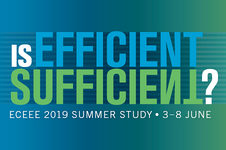EnOB:dataNWG auf der eceee Summer Study 2019
Since the 1970s, energy efficiency has contributed more to our economic prosperity than any other single source of energy supply. This is the power of a million small, and often invisible, actions. eceee makes these actions visible!
eceee, the European Council for an Energy Efficient Economy, is a membership-based non-profit association. We generate and provide evidence-based knowledge and analysis of policies, and we facilitate co-operation and networking through our Summer Studies, workshops, and social media.
EnOB:dataNWG was part of it last week, at the Summerstudy 2019 in Presqu'Île des Giens, France. More than 400 Scientists from all over the world but mainly from Europe met to discuss the key question: Is efficient sufficient? Across all scientific disciplines there was great consistency: Efficiency alone is not enough; we also need to look beyond efficiency improvements towards how we can reduce absolute energy consumption.
While residential building stocks are well monitored in order to satisfy the housing needs, in Germany as well as in many other countries the stock of non-residential buildings is a virtual unknown. However, this part of the building stock is of non-negligible relevance in climate protection strategies, hence quantification is needed.
In the project Research Database Non-Residential Buildings (EnOB:dataNWG) the objective is to shed light on the dark: For the first time, the non-residential building sector is subject to a representative sample survey concerning status and dynamics of its properties. The project is funded by the German Federal Ministry of Economic Affairs and Energy (BMWi).
A new approach became feasible due to the recent development in geospatial data. A profound analysis of the Building Polygons (HU-DE) and 3D Building Models (LoD1-DE) provided the sampling frame for the so far unknown population of non-residential buildings. The pilot project has been conducted successfully, the methodology works, first results are encouraging. At present, a representative sampling survey is on the way to explore status and dynamics of energy-related properties of this building stock. By the end of 2019 first results should be available.
